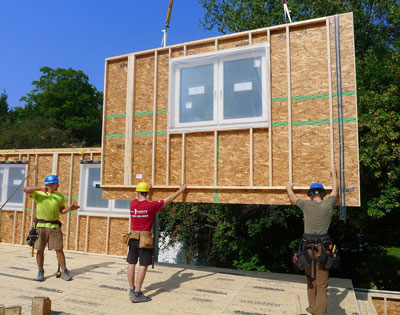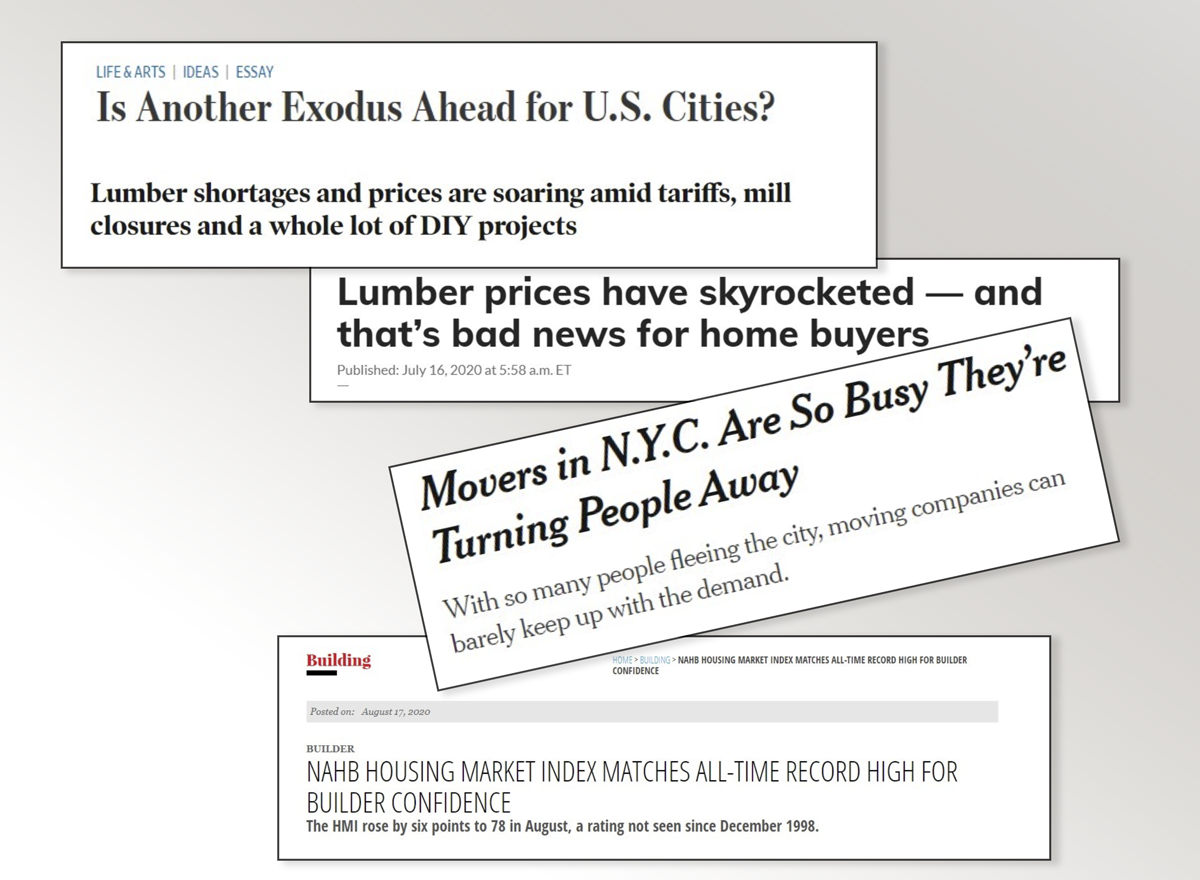The housing industry has been dramatically affected—in both negative and positive ways—by the Covid maelstrom that has been upending every aspect of our lives.
Back in February, before we really began to feel the effects of the virus here in the U.S., mortgage interest rates were low, the inventory of existing homes on the market was small, and builders were having trouble keeping up with demand for new homes. The onset of Covid caused a pause as some clients put projects on hold, consumers played wait-and-see, and tradespeople found themselves sheltering at home, but in May we began to see a resurgence of demand for new homes that shows no signs of slowing.
In the Northeast, the current wave of interest in new homes seems to be driven primarily by people looking to move from cities to less densely populated suburban and rural areas. The NY Times reports that moving companies can’t keep up with the exodus from New York. Realtors in Vermont are telling us that properties that have been on the market for years now have multiple offers above the asking price. Buyers are purchasing homes in New Hampshire based on photos and videos, without ever seeing the home in person. A realtor in the Hudson Valley said that in her 35 years in the business, she’s never seen such an active market.
Because most of the existing homes for sale are older and need work, many buyers are opting to purchase land and build a new home. But the pool of experienced contractors to build these homes is relatively small, and their availability is limited.
The construction industry has still not regained the capacity it had prior to the Great Recession. Many companies went out of business, older workers retired and were not replaced, and in general builders have been cautious about expanding. Covid has put additional pressure on an industry that was already stretched thin, as job sites were shut down and tradespeople sheltered at home with their families. The good news is that production is slowly ramping up both on job sites and in the manufacturing facilities that support construction, but it’s not yet anywhere near the level required to meet the current demand.
On the material front, for example, pressure treated lumber, decking, appliances and other basics have been in short supply, and softwood lumber prices—as one example—recently increased by 30%.

Like every other builder in the Northeast, at Unity we’ve been hit by material shortages, cost increases and labor constraints. For the most part we’ve been able to stay ahead of the curve, but the past few months have been unusually intense!
Our subcontractors are feeling similar pressures. A local electrician recently mentioned that his supplier is limiting each contractor to two breakers per day. A typical home might require forty breakers for the main electrical panel. As this sub said, “It’s hard to keep four licensed electricians busy with only two breakers per day.”
At Unity, we’ve continued to hire for our shops and our offices, but are not yet back at full production capacity. And while the Covid protocols that we’re practicing have kept our associates safe and healthy, they do have an impact on our efficiency.
What does all this mean for the many people hoping to build a new home within the next year?
Patience is critical. As with other builders, Unity’s lead times have stretched, and project scheduling has become less predictable. However, Unity’s off-site construction methods are still faster than building entirely on site.
Flexibility will be required. As schools are opening and businesses begin easing restrictions, we’re hoping for the best, but preparing for the possibility that restrictions will be reimposed.
Costs will increase, at least in the short term. But Unity will continue to provide fixed price contracts offer a hedge against cost escalations.
Resilience will be rewarded. Whether it’s resilience at the personal, family or community level, or the kind of resilience that Unity builds into its homes, the ability to ride out difficult situations with equanimity, and in safety and comfort, will be increasingly valued.
Values such as cooperation, transparency and integrity will facilitate progress. As always, it’s best to find a home building company that shares your values and understands the goals for your project.
Despite the shared challenges that we all face, sentiment in the building industry is surprisingly positive. Recent data suggests that builders nationally are very optimistic about the near-term future of the housing market. The NAHB/Wells Fargo Housing Market Index, a measure of builder confidence, rose six points to 78 in August, matching the all-time high set in 1998.
Given the historically-low interest rates, the ease with which real estate transactions (and design/build!) can now be conducted online, and the prospect that we’re likely to be living with the effects of Covid for years, this may be the time to pursue building the healthy, resilient, energy-efficient home that you’ve been dreaming of. If so, we’ll do our best at Unity to help make your dream a reality.






